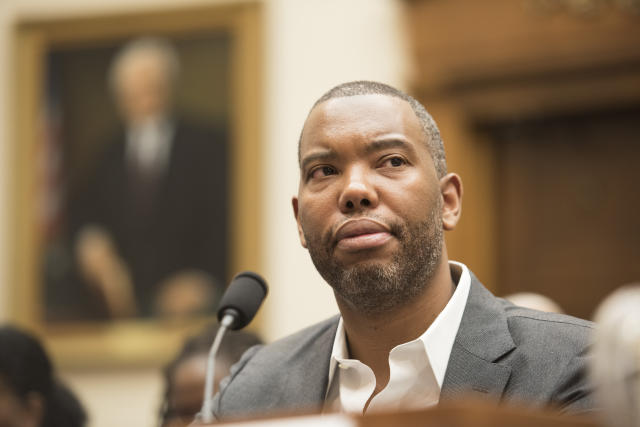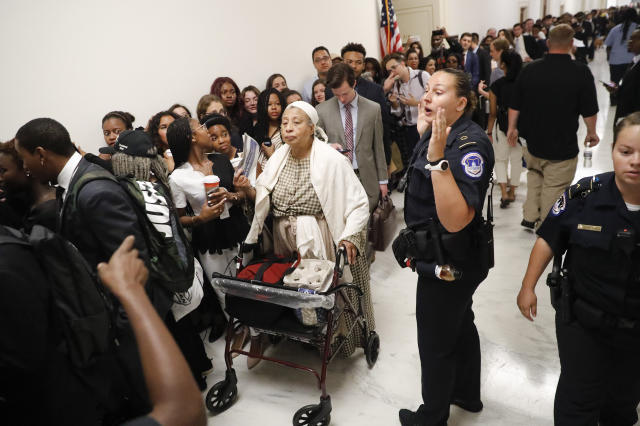A new bill would calculate potential costs of reparations — and by Yahoo Finance estimates, these could reach as high as $17.1 trillion.
Last week, the House Judiciary Subcommittee on the Constitution, Civil Rights and Civil Liberties held the first hearing in a decade on H.R. 40, the Commission to Study and Develop Reparation Proposals for African-Americans Act. The bill was first introduced in 1989 by former Congressman John Conyers (D-MI). Conyers reintroduced the bill each year until his retirement in 2017 — and each year, the bill languished in Congress.
The bill’s focus was not to pass reparations, but to research the impact slavery had on black Americans and develop proposals for redress.
‘Payments are not the focus of H.R. 40’
The subject of reparations has remained a political hot potato, with presidential candidates Sen. Kamala Harris (D-CA), Sen. Cory Booker (D-NJ), Sen. Elizabeth Warren (D-MA), Beto O’Rourke and Julian Castro supporting some form of reparations. But while the Democratic-controlled House is willing to hear the bill, it seems likely that a bill on reparations will die in the Senate where Republicans have a majority. When asked about the hearing, Senate Majority Leader Mitch McConnell (R-KY) said he opposed the measure, given that “not one of us currently living are responsible” for slavery.
McConnell continued, adding: “We’ve tried to deal with our original sin of slavery by fighting a civil war, by passing landmark civil rights legislation. We elected an African-American president.”
Rep. Sheila Jackson Lee (D-TX), a sponsor of H.R. 40 — named after the 40 acres and a mule promised to freed slaves — responded to McConnell’s comments in a statement to Yahoo Finance.
“Payments are not the focus of H.R. 40,” the congresswoman said. “Knowledge is the focus of H.R. 40.”
“The Majority Leader may want to deny this bill a hearing, but he cannot deny the horror and the denial of freedom that human bondage represents,” she said. “The Majority Leader can’t deny the free labor that slavery brought; he can’t deny the people who died in transit; and he can’t deny that this is the 400th anniversary of the beginning of the slave trade.”
The case for reparations
Activists have been calling for reparations for years, and in 2016, a UN panel declared that the U.S. owed black Americans reparations because of slavery and its link to injustices today in America.
“In particular, the legacy of colonial history, enslavement, racial subordination and segregation, racial terrorism and racial inequality in the United States remains a serious challenge, as there has been no real commitment to reparations and to truth and reconciliation for people of African descent,” the report states.
“Contemporary police killings and the trauma that they create are reminiscent of the past racial terror of lynching. Impunity for State violence has resulted in the current human rights crisis and must be addressed as a matter of urgency.”
H.R. 40 co-sponsor Rep. Ayanna Pressley (D-MA) says that reparations aren’t about “playing victim” or “race baiting”.
“If the best policies are informed by data, the data supports the fact that black Americans continue to be in the bottom of every outcome when it comes to health, education, and economics,” Pressley said in a statement to Yahoo Finance. “So much work remains to be done in order for us to bend the arc of justice to ensure the full freedom for black Americans.”
African-Americans are disproportionately targeted by the criminal justice system, accounting for 33% of the prison population, but only 12% of the adult population in the country. According to Pew Research, this is in comparison to their white counterparts who make up a third of the prison population, but over 60% of the adult population in the U.S.

But there are other disparities between the black community and their counterparts. Unemployment rates for African-Americans are twice as high as that of white workers, while black poverty rates are more than twice as high as that of their white counterparts. According to the Economic Policy Institute (EPI), the black poverty rate was 22% in 2016 — the same year, it was 8.8% for white Americans. The national poverty rate, by contrast, was 12.7%.
Wealth inequality between the races has only increased throughout the years. In 2016, according to the Inequality Project at the Institute for Policy Studies, the U.S. median wealth — or the total of all assets — for white families was just under $150,000, compared to the national median wealth of $82,000. In 2016, the median figure for African-Americans stood at roughly $3,500. That’s less than half the median black wealth 35 years ago.
And though Brown v. Board of Education integrated the nation’s schools, today, they are more segregated than ever. According to a recent study by the education research group EdBuild, there is a $23 billion gap in funding between white and non-white school districts of equal size. Roughly, this means that non-white school districts receive $2,226 less on average for each enrolled student than predominately white districts.
William Darity, a public policy professor at Duke University, has researched reparations for decades. With Professor Dania Francis at UMass Amherst, their paper, “The Economics of Reparations,” notes that the United States has paid reparations to wronged communities before, including Japanese families kept in internment camps, and Native-American tribes. But, they write, “almost 250 years of domestic enslavement of African people and their descendants have not elicited a similar response from the U.S. government.”
The cost of reparations
If reparations were to be paid to descendants of slaves, it would be costly. Many researchers have tried to place a dollar figure on the economic cost associated with hundreds of years of free labor, and accumulated wealth Southerners gained from enslaving blacks. Darity and Francis argue that any reparations paid should also be tax-free, given the nearly 100 years that black people paid taxes “while being disenfranchised in the U.S. South, a paradigmatic case of ‘taxation without representation.’”
In the essay collection “Wealth of Races,” several researchers tried to calculate the cost or “present value of benefits from past injustices.” Roger Ransom and Richard Sutch calculated that cost to be $3.4 billion between 1810 and 1860. In 2019, that would come to roughly $8.5 billion.
Economist Larry Neal tried to tabulate the price tag of unpaid wages to slaves from 1620 to 1840. In 1983 when he calculated the number, he estimated that slaves were owed $1.4 trillion in unpaid wages, or $3.6 trillion today. Economist James Marketti estimated that unpaid wages totaled somewhere between $3 trillion and $5 trillion dollars — again in 1983. Today, when accounting for inflation that number leaps to $7.7 trillion to $12.9 trillion.

But these costs do not include the lingering economic impact of Jim Crow and current discrimination that black people face in the labor market, health care system, or education and criminal justice systems. According to “The Economics of Reparations,” that figure stands at an additional $1.3 trillion to $4.2 trillion today. When totaling Marketti’s estimates along with restitution costs for racial injustice since the end of slavery, reparations could range from $9 to $17.1 trillion.
“Suffice it to say,” Darity and Francis write, “the damages to the collective well-being of black people have been enormous and, correspondingly, so is the appropriate bill.”
Paying reparations
But are reparations possible? H.R. 40 aims to determine just that. First, the U.S. government would have to determine who is eligible for reparations, and then figure out how to pay for it.
There have been different reparation proposals made through the years, and historically the U.S. has paid restitution to groups that have suffered injustices at the hands of the government. Reparations proposals have run the gamut from lump-sum payouts to a “trust fund” that could be used to finance black Americans’ pursuit of higher education or home purchases. Other options include reparations modeled after Germany’s postwar restitution plan, which combined both individual payments with financing institutions and resettlement of Jewish people in Israel.
It’s unclear how a sum as potentially as large as $17.1 trillion would be financed. Darity’s research posits that it could be financed through additional taxes, or by issuing bonds. But Darity and Francis make clear that “African-Americans should not bear the tax burden of financing their own reparations payments.”
Though H.R. 40 is seeing the light of the debate floor, the measure is still deeply unpopular. According to a 2016 Marist poll, only 26% of Americans support reparations. More than 80% of white Americans disapprove of restitution to African-Americans, while nearly 60% of black Americans support the proposal.






